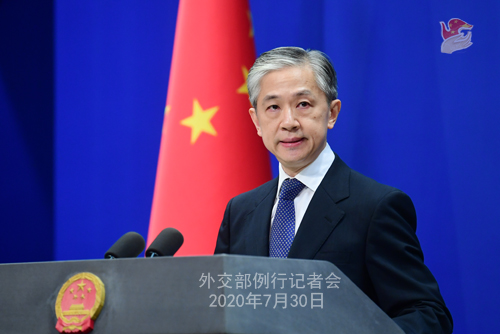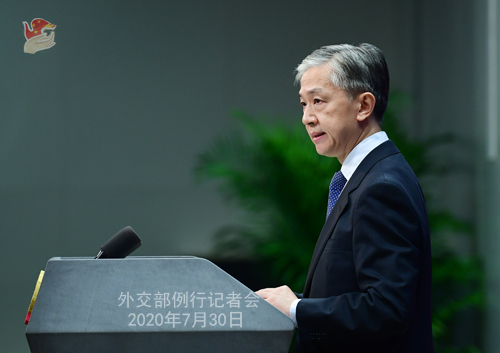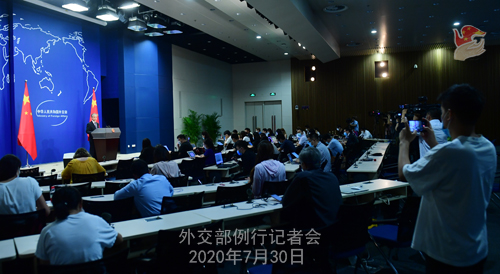| Foreign Ministry Spokesperson Wang Wenbin's Regular Press Conference on July 30, 2020 |
| 2020-07-30 21:35 |
|
CCTV: We have noted the recent frequent interactions between China and the EU. Yesterday, Vice Premier Han Zheng held a video meeting with Executive Vice President Frans Timmermans of the European Commission. The day before yesterday, Vice Premier Liu He and Executive Vice President Valdis Dombrovskis of the European Commission co-chaired the eighth China-EU High-level Economic and Trade Dialogue. What do you think of the results of these two events? Are the recent intensive high-level exchanges between China and the EU intended to send a signal to the outside world? Wang Wenbin: Indeed, there have been very frequent high-level exchanges between China and the EU recently. Vice Premier Han Zheng held a video conference with Executive Vice President Frans Timmermans, and Vice Premier Liu He co-chaired the eighth China-EU High-level Economic and Trade Dialogue with Executive Vice President Valdis Dombrovskis. They reached a lot of consensus and outcomes on advancing bilateral cooperation in the fields of economy, trade and green development. State Councilor and Foreign Minister Wang Yi also held phone calls and video meetings with the foreign ministers of France, Germany and Italy, and the 31st round of negotiations on China-EU Bilateral Investment Agreement has made positive progress. These intensive and in-depth exchanges demonstrate the political determination and capacity of the two sides to actively implement the important consensus reached at the 22nd China-EU Summit. They also demonstrate that China-EU relations are about partnership and cooperation in essence. What China and Europe support, oppose and work together on as two major forces, markets and civilizations is of global significance. Since the outbreak of COVID-19, China and the EU have supported and helped each other in the spirit of overcoming difficulties with solidarity, and maintained close exchanges and cooperation. Looking ahead, a series of important high-level exchanges and more cooperation projects are to be expected and advanced. China is ready to work with the EU in line with the principles of mutual respect and seeking common ground while shelving differences, maintain close communication and coordination, and jointly promote the China-EU comprehensive strategic partnership to a new level, for the benefit of post-COVID-19 global peace, development and prosperity. Kyodo News: If the postponed Tokyo Olympics do not go ahead next year due to COVID-19, then it will most likely trigger a knock-on effect on the 2022 Beijing Winter Games, said International Olympic Committee member Dick Pound in an earlier interview with Reuters. The Beijing Olympics could be further complicated by a number of political showdowns, he also said. I wonder if you have a comment? Wang Wenbin: Earlier on the International Olympic Committee (IOC), Japanese government and Tokyo Organizing Committee made the decision to postpone the Tokyo Olympic Games, showing their responsible attitude towards the health and safety of athletes, participants and all mankind. China will continue supporting Japan in hosting the Olympic Games and hope the Tokyo Games will be held as scheduled. As to the 2022 Winter Olympics, preparation work on all fronts is progressing as planned, which has been commended by various sides including the IOC. We will continue close cooperation with the IOC regarding preparatory work for the Beijing 2022 Winter Games. Phoenix TV: US Secretary of Defense Mark Esper announced on July 29 that the United States plans to reduce the number of troops stationed in Germany from 36,000 to 24,000. "The repositioning of our forces in Europe constitutes a major strategic and positive shift," Esper said. President Trump told the press that the US is "reducing the force because they're not paying their bills"; if Germany starts to pay, he may reconsider. Does China have a comment? Wang Wenbin: This is between the US and Germany. We have no comment. AFP: The US Ambassador to Brazil has warned that Brazil will face consequences if it picks Huawei to develop its 5G network. Do you have any comment on this? Wang Wenbin: You mentioned the remarks by US Ambassador to Brazil. That reminds me of what Secretary Pompeo and some other American politicians have been doing. They have been pressuring other countries to exclude Huawei. Their allegations about the Chinese company have no factual basis at all. The US claims that Huawei threatens US national security. But let's take a look at the facts. Over the past 30 years, Huawei has developed over 1,500 networks in more than 170 countries and regions, having 228 Fortune 500 companies as clients and serving more than three billion people all over the world. Not a single cybersecurity incident like those revealed by Edward Snowden or WikiLeaks has there been. Not a single tapping or surveillance operation like PRISM, Equation Group or ECHELON has there been. And not a single country has produced evidence of any backdoors in Huawei products. The US claims to be a defender of democracy and freedoms, but what we have seen is some American politicians including Pompeo incessantly pressuring other countries, making uninvited comments about their 5G development and openly coercing them into following its own will. This is hegemony in full display. The US keeps talking about fairness and reciprocity, but what does it do? When other countries' businesses have a competitive edge, American politicians would make up excuses and resort to state power to suppress them. They would go to any length for this, violating market economy and fair competition principles the US always claims to champion, breaking international trade rules, even hurting the interests of US consumers and businesses. The real reason behind Pompeo's animosity towards Chinese companies has nothing to do with national security or democracy, freedoms, fairness or reciprocity. It's just because they are Chinese companies and also front runners in their lines of business. Pompeo has been claiming that by excluding Huawei, countries are joining the ranks of "clean countries". The so-called "clean countries" he has been touting is nothing but a code name of double standards. We hope all countries will commit to uphold a fair, just, open and non-discriminatory business environment and reject nationality discrimination in global scientific cooperation as firmly as they reject racism.
Beijing Youth Daily: State Councilor and Foreign Minister Wang Yi and Japanese Foreign Minister Toshimitsu Motegi spoke on the phone yesterday and discussed bilateral exchange and cooperation in the next phase and in the post-COVID-19 era. Can you give us more details on that? Wang Wenbin: On July 29, State Councilor and Foreign Minister Wang Yi had a phone call with Japanese Foreign Minister Toshimitsu Motegi. The two sides had in-depth exchange of views and reached consensus on bilateral relations, exchange and cooperation in various fields. There's a press release issued by the Chinese side, and here I'd like to stress the following two points. First, despite the severe challenges brought by the pandemic, China-Japan economic and trade cooperation still yielded good results thanks to concerted efforts by both sides. In the first half of this year, bilateral trade reached nearly $150 billion, and Japan's investment in China stood at around $2 billion, basically the same volume as that of the same period in 2019. These notable results demonstrate the deep foundation, strong resilience and enormous potential in China-Japan relations. Second, both sides stressed the importance to keep up dialogue and communication at various levels and in various fields. Since COVID-19 broke out, as neighbors with traditional friendship, China and Japan have been in communication on anti-epidemic cooperation with mutual support. The two sides agree to maintain closer communication and coordination and further facilitate the restoration of bilateral people-to-people exchange. It will help the two countries resume work and production, maintain the steady operation of industrial and supply chains, and contribute to economic recovery in the region. In the post-COVID-19 era, we hope both sides can jointly keep the bilateral relationship moving in the correct direction, enhance cooperation in fighting the virus, boosting economic recovery and upholding regional peace and stability, deal with regional and international challenges together, and inject new impetus into the development of China-Japan relations. AFP: The Indian Defense Minister has said that those who want to threaten India's territorial integrity should be worried about new fighter jets bought by India from France. And observers are calling it a veiled warning to China. Do you have any comment on this? Wang Wenbin: We hope remarks from the Indian side will be conducive to peace and stability in the region. China Review News: Former US senior diplomat Charles Freeman said in a recent interview that US Secretary of State Pompeo's latest speech on China runs entirely contrary to history and realities. He said that overall the US engagement policy with China was "brilliant" and helped keep the peace. He noted that Pompeo's speech served domestic political agenda instead of foreign policy goals. Pompeo also has ambitions to run for president himself. Do you have any comment on this interview? Wang Wenbin: We noted there has been a lot of doubt and criticism on Pompeo's speech raised by veteran US politicians, American experts and the media, which clearly shows that denying the progress in China-US relations and instigating ideological confrontation gains little support. For nearly half a century, China-US exchange and cooperation has been expanding and deepening, bringing tangible benefits to people in both countries and beyond. This is a visible fact that cannot be erased. The China-US relationship bears on the well-being of Chinese and American people as well as world peace and stability. It shouldn't fall prey to the manipulation of certain people and political forces as they seek selfish gains. AFP: The US government is about to complete its national security review of TikTok. Does China have any expectations for the outcomes of the review? Wang Wenbin: The Chinese government always asks Chinese companies to observe laws and regulations when doing business with foreign countries. Without any evidence, the US is threatening a Chinese company based on presumption of guilt, revealing its hypocrisy in so-called "upholding fairness and freedoms." This is in violation of the WTO principles of openness, transparency and non-discrimination, and it doesn't serve the interests of the American people and companies. Governments and media of some countries have emphasized that there shouldn't be any "double standard" when it comes to social media. China's software and apps meet people's need and market demand, provide diversified choices, and help social media markets in all countries grow in a sound manner. We call on some in the US to heed the voices from the international community, provide an open, fair, just and non-discriminatory market environment for entities of all countries including China, and stop politicizing trade and economic issues. This concerns the image and credibility of the US.
|
| |||||||||||||||
|
|||||||||||||||




